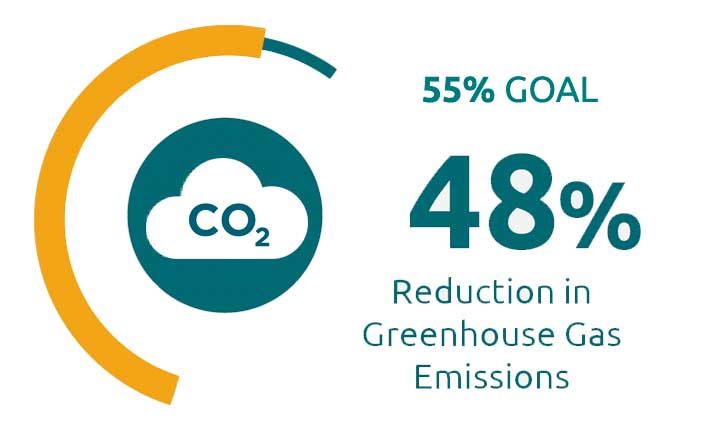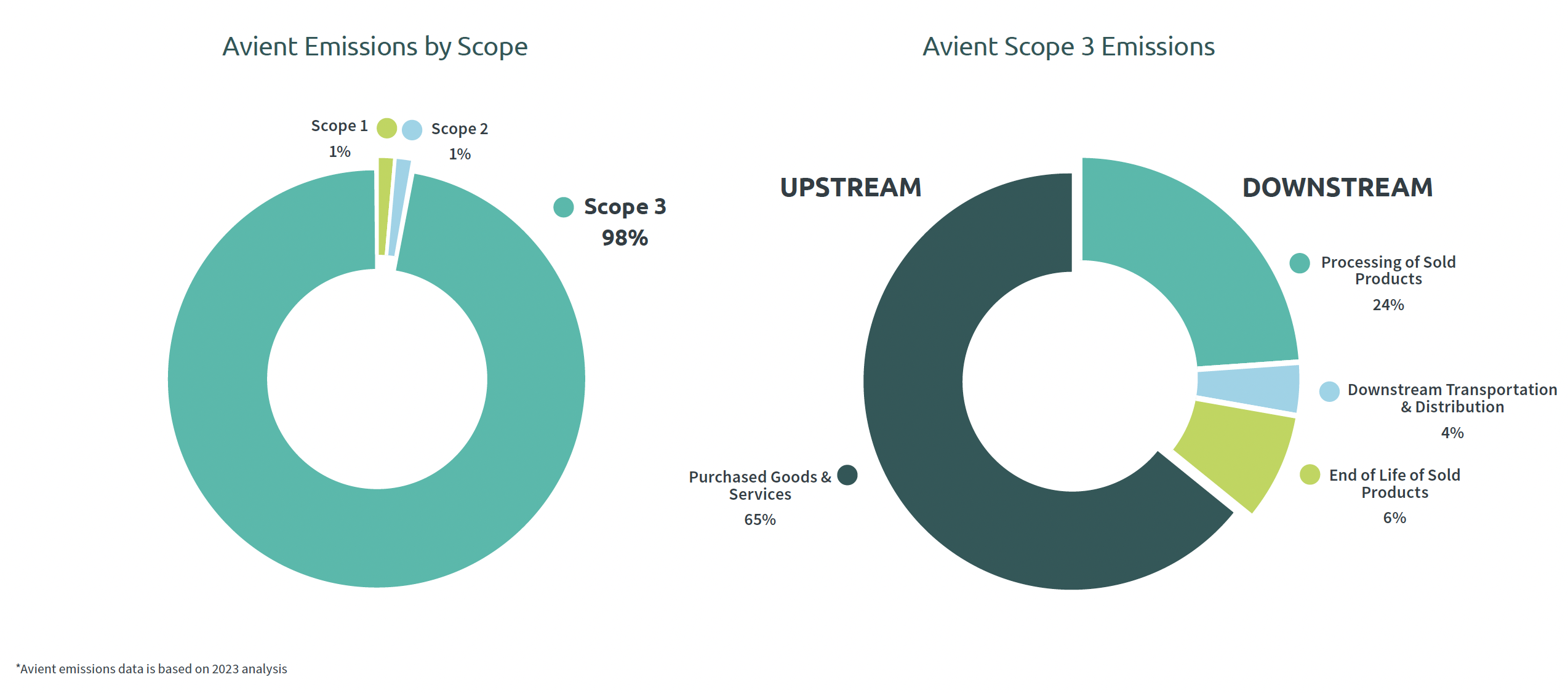
气候变化
Energy and Greenhouse Gas (GHG) Emissions
我们的碳中和之路
Climate change is one of the most pressing issues facing the world today and is creating risks and opportunities for businesses across all industries.
在 Avient,我们认识到可持续的商业实践能够对气候变化问题产生积极影响。我们矢志不移地对整个供应链和所有利益相关方实行多方面的全球方法,以便成功解决该问题。While we remain focused on achieving our 2030 GHG and energy goals, we believe further actions and strong leadership are critical to addressing climate change and ensuring a stable and sustainable planet.

That is why, in support of the objectives of the Paris Agreement, our ambition to achieve operational carbon neutrality by 2050 and aligned goals with our RE100 commitment. We know the path to achieving carbon neutrality will not be easy. We have been working with internal and external stakeholders to understand how we can achieve our goal to become carbon neutral in line with climate science. And, we are finding new ways of operating, adopting new technologies, and innovating more sustainable products. Some technologies needed are not yet available at scale, which limits our ability to take certain actions in the short term. However, by taking advantage of developments in longer-term carbon management and removal technologies and circularity, we are committed to enabling positive climate impacts across our value chain.

In support of this climate transition, Avient has focused its continuous improvement efforts on:
- Investing in resources and existing technologies to optimize operations, including improvements in energy efficiency and waste reduction
- Maximizing the use of renewable energy in our operations
- Adopting new technologies in our global network of facilities
- Continuing to develop new and innovative products that have sustainability attributes that decrease GHG emissions and enable the world’s transition to a lower-carbon economy
- Advancing circularity in our operations and our customers’ products
- Partnering with our suppliers to enhance the eco-efficiency of our supply chain

Better Plants
Avient proudly announced its partnership with the U.S. Department of Energy’s Better Plants Program in 2023. This represented another step in our commitment to enhancing our operational energy efficiency.
As part of our alignment with Better Plants, we have pledged to reduce our energy intensity by 25% over the course of 10 years, demonstrating our dedication to sustainable practices and bolstering our competitiveness in the industry.
As part of the Better Plants Program, Avient received a 2025 Better Practice award, which recognizes partners for innovative and industry-leading accomplishments in implementing and promoting practices, principles and procedures of energy management.
Avient received this award as a result of our annual incentive plan metrics, which included a 3% waste-to-landfill intensity reduction target to drive increased employee and site-level engagement for our 2030 sustainability commitments. Since the launch of this incentive program in 2023, Avient has reduced waste-to-landfill volume by over 25% and total waste volume by over 6%. We have completed over 100 waste minimization projects globally, driving site-specific and innovative solutions.
Energy and Greenhouse Gas (GHG) Emissions
To drive progress toward carbon neutrality, Avient’s low carbon transition plan targets intermediate (2030) goals around Scope 1 (direct) and Scope 2 (indirect) sources of greenhouse gas emissions. These targets are in line with prevailing climate science limits that keep global warming below 2 degrees Celsius, as detailed by the Paris Agreement and Science-Based Target Initiative (SBTi).
To better reflect the actual price of CO2 to society, and ensure costs are within the ranges of the scenarios we use for assessing climate transition risks, Avient has instituted an internal cost of carbon. This tool encourages investments in low-carbon and carbon-free technologies while increasing the visibility of, and encouraging accountability for, the impact of carbon emissions on the business.
Avient 在温室气体和其他污染物排放方面采用的方法集中在四个主要领域:
- Improving equipment and building energy efficiency;
- Process transformation;
- Expanding the use of renewable or low-carbon energy, and;
- Supporting technology breakthroughs by meeting our customer’s sustainable solution needs.
我们减排计划的总体管理战略由 Avient 可持续发展委员会地球小组委员会领导。This committee is comprised of global operations and sourcing leaders and ensures continual progress towards our sustainability goals and operational efficiency goals. Execution of this strategy is achieved by our business units working closely with individual facilities, the EH&S team, and the Planet Sub-Committee.
Most of Avient’s Scope 1 and 2 GHG emissions are attributed to the consumption of energy. The primary energy source at our facilities is electric power, followed by natural gas. Details of our energy sources can be found in the Metrics section. Strategic plans at the facility and business unit level include planned efforts to achieve sustainability and operational goals. In 2024, we were able to further optimize energy consumption by executing 103 energy saving projects around the world. Additionally, Avient introduced Energy Project Awards for projects completed in 2024 in categories such as Most Creative Solution, Best Low- or No-Cost, People’s Choice, and Best Overall.
For detailed information on these projects, our energy and third party verified carbon emissions performance, risks and opportunities presented by climate change, and associated governance systems, we invite you to read our most recent Climate Change Report submitted to CDP.
Reducing Emissions Across Our Value Chain
Scope 3 emissions include upstream emissions from products and services we procure from suppliers, as well as downstream emissions from the transportation of our products and the emissions generated from the use and disposal of our sold products. Avient captures information related to all fifteen categories of these emissions. Understanding these emissions is important to Avient. Scope 3 emissions are many times greater than our combined Scope 1 and 2 emissions. Approximately 90% of our Scope 3 emissions come from purchased goods and services and downstream processing of sold products (65% and 24% respectively). This highlights how critical it is to collaborate with suppliers and customers across our value chain to reduce emissions.

Continuous improvement efforts led Avient to initiate a targeted assessment of 568 suppliers and our 25 largest customers to assess availability of carbon emissions data and reduction plans. Our latest assessment identified that less than 50% of suppliers and customers have existing greenhouse gas commitments. This data is being utilized to define our capabilities to influence these stakeholders and initiate mutually beneficial partnerships. These partnerships will be leveraged to further improve the accuracy of our Scope 3 values along with our ability to take action and track progress toward future emissions reduction goals.
